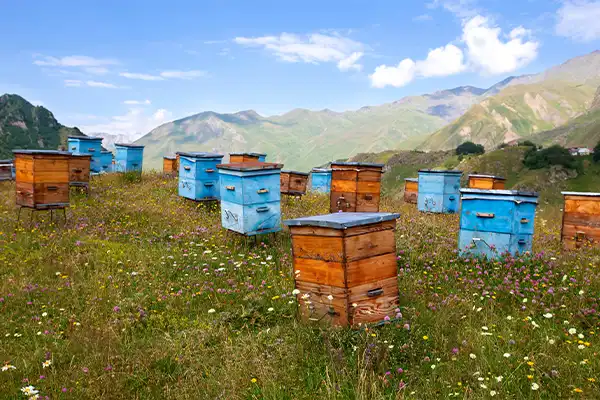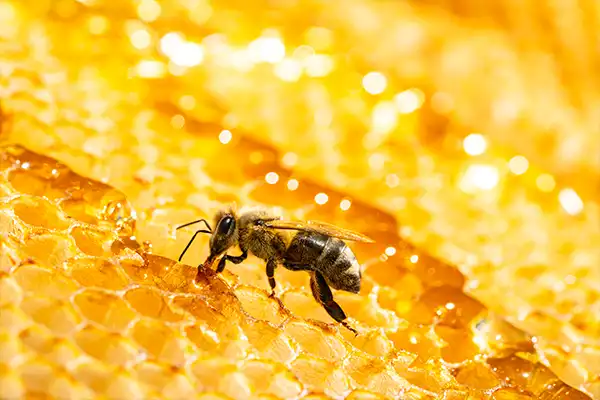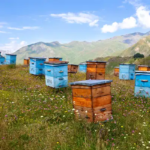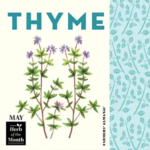“Tell It To the Bees” And More Honey Bee Legends

Ever hear the expression “tell it to the bees?” Learn what it means, as well as other interesting lore and legends about honey bees.
Honey Bee Lore and Legends
The value of honey bees has been recognized for millennia. In ancient Egypt, bees were believed to have been formed from the tears of the sun god, Ra, to bring his messages to earth. Likewise, in ancient Greece and Rome, bees were seen as messengers of the gods. Ancient Chinese and Celtic civilizations considered honey as a sacred gift that helped the dead in the afterlife.
RELATED: Finding Dimes? Signs from the Deceased

“Tell It to the Bees“
The ancient practice of “telling it to the bees” is still popular in both western Europe and Appalachia in the United States. Bees are such a valuable resource to support a family, so people in these areas feel that they should be treated with the same respect of family, especially when there are major changes.
RELATED: 10 Common Superstitions
For example, when a beekeeper dies, the bees must be gently told of the change of family leadership (as the keeper is the head of the “family” hive). If not, the bees may abandon the hive and family, or mourn so deeply that their productivity will be dramatically reduced.

Sing, Don’t Swear
Beekeeping lore insists on always treating a hive with respect and gentleness. Singing to the hive is even encouraged to improve bees’ productivity.
Bees are believed to be sensitive creatures. Many believe that their productivity can be impacted if they hear swearing or arguments.
Honeymoon
The word “honeymoon” is believed to originate with a Scandinavian tradition of giving a newly married couple a month’s worth of “honey wine” or mead (a fermented honey drink). This gift would celebrate the sweetness of new marriage and encourage happiness.
RELATED: Best Days to Get Married

More Bee Lore
- If a bee flies into your house, you will have a visitor. However, be sure to keep it safe or the visitor may bring bad news.
- If a bee lands on your hand or head, you will receive a reward soon.
RELATED PRODUCT: Good Luck Bracelet
- Ancient Greeks believed that if a bee landed on a baby’s lips, that baby would turn out to be a great speaker.
- Romans believe that Jupiter gave bees their stingers so they could defend their honey. It’s also believed to repay Jupiter for this ability, honey bees would have to die when they sting you.
RELATED: How to Locate Jupiter in the Night Sky
- Cheating spouse? Supposedly if you lead a man you are suspicious of cheating past a beehive, he’ll only be stung if he’s been unfaithful.
Keep the Legends Alive
With so much wonderful lore associated with bees, what can we do to better protect bees today?
- Minimize chemical use, including fertilizers, pesticides, and herbicides, can help prevent toxic contamination that kills bees.
- Plant a bee garden with flowers rich in nectar and pollen. This will give bees a refuge, and adding a shallow “bee bath” as a water source is a great step.
- Don’t mow patches of your lawn to give honey bees places to nest to encourage the next generation.
- Buy local honey and bee-related products to support the next generation of beekeepers, keeping local hives thriving.
Do you have any questions? Let us know in the comments below!
What Bees Give Us
Honey bees are essential to our ecosystem. There are more than 16,000 species of bees in the world. They are found on every continent except Antarctica. Bees pollinate beautiful flowers as well as a wide range of fruits and vegetables, from apples, blueberries, and cherries, to avocados, pumpkins, coffee, mangos, and more.
Bee venom is often used in homeopathic or alternative remedies* for its anti-inflammatory properties, and beeswax is used for candles and soap. *Note: Farmers’ Almanac does not offer medical advice. Information contained here is for educational purposes only.
Beekeeping has been a skilled profession since ancient Rome and Egypt and continues today. From both bee-related products to the greater agricultural yields that come with more pollination, bees are estimated to contribute $19 billion to the U.S. economy annually, and more than $217 billion to the worldwide economy.
With so many positive impacts from bees, it is no wonder that these industrious insects have been part of our lore, superstitions, and cultural beliefs for centuries.
Join The Discussion
Do you believe if you “tell it to the bees” or sing to bees that you’ll get more honey?
Do you know any fun facts or bits of folklore about bees not mentioned here?
Share with your community here in the comments below!







